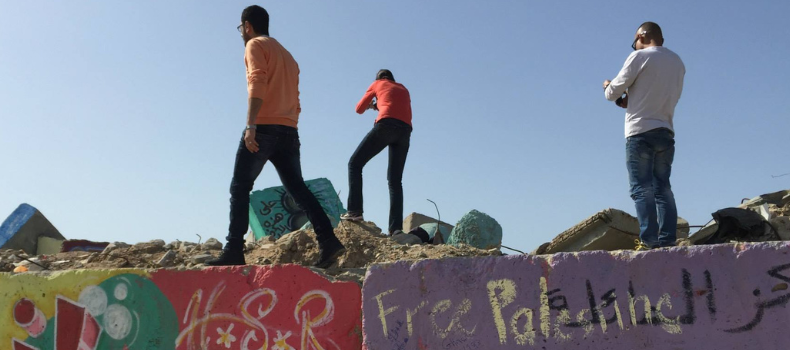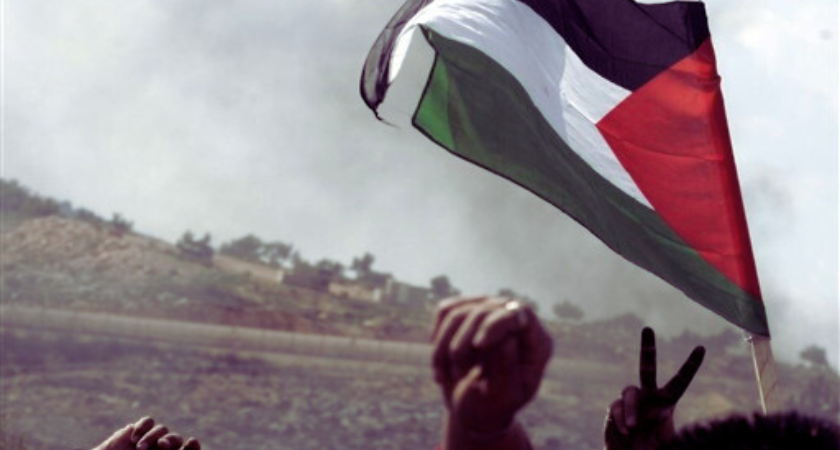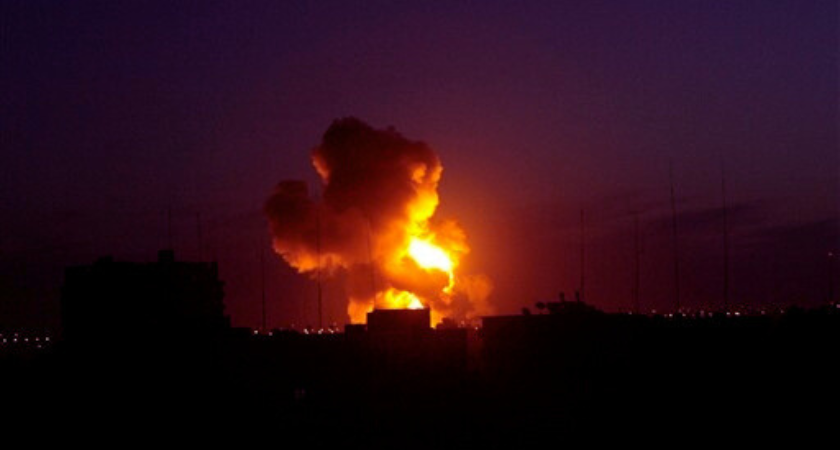Gaza / Israel: ICJ sets hearings in Nicaragua’s lawsuit against Germany

We share the text written by Professor Nicolás Boeglin, from the Law School of the University of Costa Rica. Original title: “Gaza / Israel: International Court of Justice (ICJ) sets hearings in Nicaragua’s lawsuit against Germany”.
We fear that this already catastrophic situation may slide deeper into the abyss as many Palestinians mark the holy month of Ramadan – a period that is meant to honour peace and tolerance – should Israel launch its threatened military offensive into Rafah, where 1.5 million people have been displaced in deplorable sub-human conditions.
Spokesperson, UN High Commissioner for Human Rights, Geneva, “Fears over Gaza catastrophe as brutal conflict enters sixth month”
Any ground assault on Rafah would incur massive loss of life and would heighten the risk of further atrocity crimes. This must not be allowed to happen. We also fear that further Israeli restrictions on access by Palestinians to East Jerusalem and Al Aqsa Mosque during Ramadan could further inflame tensions.
The UN High Commissioner for Human Rights repeats that there must be an immediate end to this conflict, and that the killing and destruction must stop.
Official statement, March 8th, 2024
On March 15, 2024, the International Court of Justice (ICJ) reported that hearings were set for April 8 and 9 in the case of the action brought by Nicaragua against Germany before the international judge in The Hague.
This is a complaint from Nicaragua filed on March 1, 2024, accompanied by a request for urgent interim measures. It accuses Germany of failing to fulfill its obligations to prevent genocide in Gaza. It is based on the 1948 Convention on the Prevention and Punishment of Genocide (a multilateral convention to which Germany and Nicaragua are States Parties).
The official ICJ press release on the setting of these hearings is available in French and English.
Brief Background
This Nicaraguan action stems in large part from the action initially brought by South Africa against Israel and the injunction heard in The Hague on January 26, 2024.
As will be recalled, South Africa first filed a request against Israel with the ICJ on December 29, 2023. To which the ICJ responded by an ordinance on January 26, 2024. (See official text of the said ordinance in French and in English and in particular what was ordered to Israel in operative paragraph 86).
Subsequently, South Africa presented:
- a second request submitted on February 12, 2024. To which the ICJ responded on February 16 by a simple press release (see text in French and English). It is indicated that no further measures to those ordered to Israel on January 26 were necessary for the time being;
- a third request by South Africa (the full and detailed reading of which is recommended) filed on March 6, 2024. It can be consulted at this official ICJ link in English. The ICJ has not yet provided a response.
Gaza Germany
It should be recalled that Nicaragua, as well as more than 150 States, expressed its satisfaction and support for the South African lawsuit filed before international justice (see press release from Swiss Info of January 10, 2024). In Latin America, the first state to express its support for South Africa’s claim was Bolivia in an official communiqué from its diplomacy, dated January 7 (see full text of the communiqué).
It is also appropriate to point out that Nicaragua has not maintained diplomatic relations with Israel since June 2010. (See note from El Tiempo / Colombia of June 1, 2010). This is a situation that Nicaragua shares with other states in Latin America. Bolivia (October 2023) and Belize (November 2023) are the last two States to have proceeded to break diplomatic relations with Israel (Note 1).
Nicaragua and the Palestinian Cause: A Long History

From a historical point of view, it is worth noting that in the 60’s and 80’s, Nicaragua and Israel maintained very close relations in terms of military cooperation. This explains why, since July 1979 in Nicaragua, its authorities have been so close to the Palestinian cause. In this article, entitled “Israeli Agency in the Iran-Contra Affair” published in 2016, we read (pages 8-9) that:
In February 1957, a Nicaraguan delegation to Israel negotiated a $1.2 million arms deal with Shimon Peres who was the director general of the Israeli Defence Ministry. According to the Stockholm International Peace Research Institute (SIPRI), by the 1970s Israel accounted for 98% of Nicaragua’s arms imports. This included tanks, light aircraft, armoured cars, ammunition, and automatic rifles. In early 1978, Somoza changed his National Guard’s standard arms from the American Garan M-1, to the modern Israeli Galil assault rifle.Some members of the National Guard were also armed with Israeli made lightweight UZI submachine guns. In January 1979, a group of American diplomats expressed concern over Somoza’s military overconfidence, that “one reason Somoza was so cocky in resisting pressures to resign was the knowledge that Israel, which had been a full-times arms salesman working the countries of the Caribbean Basin, could and would supply whatever the National Guard needed.
In Managua, for the commemoration of the 10th anniversary of the death of Palestinian leader Yasser Arafat, an official ceremony was held with the highest authorities of Nicaragua (See press release of November 2014). Recently – end of January 2024 -, the death of a renowned Nicaraguan poetess whose family was originally from Palestine was reported. She sentimentally accompanied Yasser Arafat (see file photo contained in this note from La Prensa de Nicaragua, and this press release from January 28, 2024).
Nicaragua In Support Of South Africa And The Civilian Population In Gaza Under Siege
With regard to other States that support the actions of South African diplomacy against Israel, we have already had the opportunity in a previous note to explain the scope of the request for intervention submitted by Nicaragua on January 22. Which was made known by the ICJ on February 8, 2024. (See our previous note entitled “Gaza / Israel: regarding Nicaragua’s recent request for intervention before the International Court of Justice (ICJ) in South Africa’s lawsuit against Israel“).
Now, in addition to this request for intervention as a third State in the dispute between South Africa and Israel, Nicaragua filed a claim before the ICJ, this time against Germany. This application was accompanied, as previously stated, by an urgent request for urgent provisional measures.
This initiative was formally registered on March 1st (see official text of their complaint). Nicaragua points out in its brief that Germany is ignoring with its actions and official statements in favor of Israel the obligations that every State Party to the 1948 Genocide Convention must respect. This includes the obligation to prevent a new genocide, particularly if it is a state exporting arms to Israel.
Gaza Germany
The lawsuit also challenges Germany’s decision to suspend sine die its contributions to the United Nations Relief and Works Agency for Palestine Refugees in the Near East (UNRWA). A decision taken with the United States, Canada and several other European states following accusations launched by Israel against this UN agency. (This link details the contributions of each state and international organization to UNRWA). As a detail of interest, these Israeli accusations came just hours after the ICJ’s January 26th order was announced. A coincidence of timing or a subtle maneuver to divert attention from Israel’s resounding diplomatic failure at The Hague?
As of March 1, Israel had not yet sent the “irrefutable evidence” to UN investigators (see note from The Guardian). In this regard, it should be noted that last March 10, Sweden and Canada announced that they would resume funding this important humanitarian agency. (See note from the BBC). As did Australia, announcement released last March 15 by Australian authorities (see note from the AP agency). And Finland this March 22 (see press release).
Gaza Germany
Meanwhile, Norway had indicated that it would not suspend its contributions pending the release of “strong evidence” on the alleged involvement of this agency’s personnel in the attack perpetrated by Hamas on October 7 (see note from the Times of Israel of February 1).
An early New York Times article from March 3 (see text) and a note from the BBC on March 11 note that Israel’s alleged “irrefutable evidence” against several UNRWA officials was obtained through confessions after resorting to threats, intimidation, torture and mistreatment of all kinds.
A fact to be contrasted with the lightness with which the initial decision was taken to suspend the contribution to UNRWA by Germany, the United States and other States, based on the only information provided by Israel (Note 2).
En el caso del Reino Unido, la cadena de noticias AlJazeera concluyó un extenso reportaje publicado el 13 de marzo cuya lectura se recomienda (véase enlace) señalando que: “Al Jazeera seguirá adelante con su petición de que la Oficina de Asuntos Exteriores, Commonwealth y Desarrollo del Reino Unido comparta las acusaciones israelíes contra la UNRWA que recibió“.
Regarding AlJazeera, an interesting report – rarely referenced in European or North American international media – released in Israel by the Haaretz newspaper explains the pro-Israeli information network that has concentrated much of its efforts on discrediting UNRWA (see report from AlJazeera of March 19, 2024).
Nicaragua’s Warning To Several States Exporting Arms To Israel
With respect to Nicaragua and arms transfers to Israel, it should be noted that a month earlier, on February 1, 2024, an official communiqué from Nicaragua warned Germany, Canada, The Netherlands and the United Kingdom of such an action: see in this regard the text of that communiqué reproduced in this link from Nicaragua’s El19Digital media outlet. In this document annex to Nicaragua’s lawsuit, you can see the details of the contents of Nicaragua’s initial letter to Germany (pages 2-9).
It seems that, at least for the moment, it is against Germany that Nicaragua has decided to concentrate its actions before the judge in The Hague. The exact reasons for this choice among the states supplying arms to Israel are not explained in its brief.
In the case of Netherlands, last February 12, Israeli authorities were informed of a national court ruling ordering an immediate halt to exports of components to Israel for F-35 fighter jets from the Netherlands (see note from the BBC on February 12). In the case of UK it was indicated on February 21 (see note from The Guardian) that should Israel launch its offensive on Rafah, UK arms exports to Israel would be suspended.
In the case of Canada, it was reported on March 14 (see note from CBC News) that a request from Israel for military vehicles – possibly of an urgent nature – is being handled in a less than expeditious manner by Canadian authorities. Last March 19, a first vote by Canadian congressmen demanding an immediate halt to arms exports to Israel was reported in Canada (see note from The Guardian).
Arms Transfers To Israel Before An International Judge Who Described The Risk Of Genocide In Gaza As “Plausible”

In a recent note EuroNews press release dated March 11 on the global arms trade, it states that:
The US and Germany accounted respectively for 69% and 30% of arms imports by Israel, which is currently fighting a deadly war against Hamas in Gaza which killed over 30,000 people, most of whom were civilians.
To date, we have not had access to any technical report or comparative table of a public nature, published in a specialized center on arms transfers, regarding the exact origin of the arms, ammunition and electronic components that Israel imports to equip its army (and we thank our esteemed readers to refer it to the author if they know of its existence by sending a message to: cursodicr(a)gmail.com). If the above data is confirmed, Germany would be the second State to supply Israel with weapons after the United States.
In its complaint against Germany, Nicaragua states (paragraph 53):
53. /…/ By the end of 2023, the German Government had granted military exports to Israel in the amount of 326,505,156 euros. On January 2024, German media reported that Israel had made a request for tank shells, especifically 10,000 120-millimeter Rheinmetall precision rounds. Der Spiegel reported that Germany had agreed to deliver the request from its own stocks in order to be able to comply with the “urgency”. According to information made available by the German Government, export licences granted between January 2024 and 15 February 2024 concerned military equipment worth 9,003,676 euros.
Gaza Germany
It should be noted that the arms trade is a specific area of public international law, with ramifications in domestic law when there is a risk of misuse, and with a legal regime that entails domestic responsibilities of arms exporting States, as was well analyzed in a paper published in 2021 that concludes (page 53):
Legal challenges are gradually becoming a pragmatic response in the face of apparently unlawful decisions by arms exporting states. Governments should recognise this shift and the possibility that their decisions on arms exports will increasingly be subject to legal challenges before domestic courts. Their decisions must be able to withstand judicial oversight and must conform with obligations under both international and domestic law.
(Note 3).
It is noteworthy that last March 6, the pressure has become greater on the US Executive Branch when the Washington Post published a report entitled “U.S. floods arms into Israel despite mounting alarm over war’s conduct” (whose full reading is recommended), in which the total opacity of the US arms transfers to Israel since October 7 is evidenced.
Gaza Germany
From a legal point of view, it is worth noting that neither Israel nor the United States are States Parties to the Arms Trade Convention adopted in 2013, whose number of States Parties stands at 113 (see official status of signatures and ratifications). Within the United Nations Security Council, of the five Permanent Members, only the United States and Russia persist in not submitting to the obligations contained in this multilateral treaty.
With regard to the United States and the opacity mentioned above, we must add the limited understanding that the American public has of the reality in Gaza, and the biased way in which the United States gives journalistic coverage to the inhuman drama in Gaza: in this regard, we recommend listening to this recent (and very complete) interview by Democracy Now.
Finally, in the case of France, a very precise question asked since March 7, 2024 to the French Ministry of Defense by a senator regarding the use given to “ML4” type military components exported to Israel (see question), awaits an answer. An earlier, more general question asked in November 2023 was answered in February 2024. The answer concluded (see link) that:
La France a rappelé le droit d’Israël à se défendre, qui doit s’exercer dans le respect du droit international humanitaire. Le respect des droits de l’homme et du droit international humanitaire par le pays destinataire, de même que les conséquences pour la paix, la sécurité et la stabilité régionales, sont pleinement pris en compte dans le cadre de l’examen des exportations de matériel de guerre par la CIEEMG. Cette stricte grille d’analyse n’a pas conduit à suspendre intégralement le flux d’exportations de matériels de guerre depuis le 7 octobre 2023.
Nicaragua’s Final Petition In Brief
In its request to the ICJ sent by Nicaragua, and more specifically in the final part of its petition in which it asks the ICJ to order urgent provisional measures against Germany, we read that Nicaragua requests several points from the ICJ judges, namely (paragraph 101):
…, Nicaragua respectfully requests the Court, as a matter of extreme urgency, pending the Court’s determination of this case on the merits, to indicate the following provisional measures with respect to Germany in its participation in the ongoing plausible genocide and serious breaches of international humanitarian law and other peremptory norms of general international law occurring in the Gaza Strip:
(1) Germany shall immediately suspend its aid to Israel, in particular its military assistance including military equipment, in sor far as this aid may be used in the violation of the Genocide Convention, international humanitarian law or other peremptory norms of general international law such as the Palestinian People’s right to self-determination and to not be subject to a regime of apartheid;
(2) Germany must immediately make every effort to ensure that weapons already delivered to Israel are not used to commit genocide, contribute to acts of genocide or are used in such a way as to violate international humanitarian law;
(3) Germany must immediately do everything possible to comply with its obligations under humanitarian law;
Gaza Germany
(4) Germany must reverse its decision to suspend the funding of UNRWA as part of the compliance of its obligations to prevent genocide and acts of genocide and the violation of the humanitarian rights of the Palestinian People which also includes the obligation to do everything possible to ensure that humanitarian aid reaches the Palestinian people, more particularly in Gaza;
(5) Germany must cooperate to bring to an end the serious breaches of peremptory norms of international law by ceasing its support, including its supply of military equipement to Israel that may be used to commit serious crimes of international law and that it continue the support of the UNRWA on which this Organizations has counted and based its activities.
It will be noted the very varied range of Nicaragua’s petition against Germany, and the repeated reference in several parts of Nicaragua’s petition to “peremptory norms of general international law” (better known in the doctrine as norms of jus cogens): these are norms considered superior to all others, and which do not admit of any exception, binding all States equally.
This specific category of norms was enshrined in the 1969 Vienna Convention on the Law of Treaties (see text) in its Article 53: any treaty whose provisions violate peremptory rules of general international law is considered legally void. Beyond the doctrinal discussion on the exact content of jus cogens norms, the prohibition of genocide and the prevention of genocide can be regarded as “peremptory rules of general international law“, which bind all states equally, Germany included.
Since Germany is not Israel’s only supplier of arms or electronic components for military purposes, Nicaragua’s petition should be of interest to many other States Parties to the 1948 Convention against Genocide; and, incidentally, it should also be of interest (in Germany) to groups of social organizations which, unless we are mistaken, have not bothered to activate the legal mechanisms provided for when German arms are exported to destinations where their misuse against defenseless civilian populations is evident (Note 4). A recent poll in Germany indicates that 69% of Germans consider Israel’s military actions in Gaza unjustifiable (see graph from ZDFHeute released on March 23 on social networks).
Israel’s Senselessness Against Gaza’s Civilian Population

The latest UN status report prior to the ICJ announcement of this March 15, 2024 (see report as of March 15) points out the level of foolishness that has been reached in Israel ignoring what has been ordered by the ICJ since January 26, 2024, reading that:
Intense Israeli bombardment and ground operations as well as heavy fighting between Israeli forces and Palestinian armed groups continue to be reported across much of the Gaza Strip, particularly in the Hamad area of Khan Younis, resulting in further civilian casualties, displacement, and destruction of houses and other civilian infrastructure.
Between the afternoon of 14 March and 10:30 on 15 March, according to the Ministry of Health (MoH) in Gaza, 149 Palestinians were killed and 300 Palestinians were injured. Between 7 October 2023 and 10:30 on 15 March 2024, at least 31,490 Palestinians were killed in Gaza and 73,439 Palestinians were injured, according to MoH in Gaza.
Between the afternoons of 14 and 15 March, according to the Israeli military, there were no Israeli soldiers killed in Gaza. As of 15 March, 247 soldiers have been killed and 1,476 soldiers injured in Gaza since the beginning of the ground operation, according to the Israeli military. In addition, over 1,200 Israelis and foreign nationals have been killed in Israel, the vast majority on 7 October. As of 15 March, the Israeli authorities estimate that 134 Israelis and foreign nationals remain captive in Gaza, including fatalities whose bodies are withheld.
Gaza Germany
Regarding the death and injury figures provided by the United Nations, we refer to a response that we should have given to the Israeli ambassador to Costa Rica, in the framework of a public forum organized by the University of Costa Rica (UCR) on March 13, 2024 and entitled “Historia y desinformación: perspectivas críticas sobre el conflicto Gaza /Israel“: in a rather questionable manner, Israel’s top representative in Costa Rica considered it useful and opportune to “warn” hours before the event to its organizers, of the lack of validity of the figures on dead and wounded in Gaza that are circulating (see our response in the video of the event, at mn. 1:25:11).
It is worth noting that, 24 hours after that forum, it was reported that the Rector of the UCR declined an invitation from the same Israeli diplomat for a meeting at her home (see note from the University Weekly of March 14, 2024).
It is appropriate to note that, contrary to what one would expect from a State subject to an ICJ injunction, Israel has stepped up its actions to prevent humanitarian aid from reaching Gaza since January 26. A recent report prepared by the British NGO OXFAM, entitled “Inflicting unprecedented suffering and destruction: seven ways the government of Israel is deliberately blocking and/or undermining the international humanitarian response in the Gaza Strip” (see link) concludes (page 15) that:
Humanitarian access in the Gaza Strip has effectively worsened since the International Court of Justice ordered Israel to ‘‘take immediate and effective measures to enable the provision of urgently needed basic services and humanitarian assistance to address the adverse conditions of life faced by Palestinians in the Gaza Strip’. The continued deliberate deprivation of access to basic assistance directly increases starvation against the backdrop of a serious risk of genocide.
Gaza Germany
This March 21, 2024, it was the same United Nations Committee on the Rights of the Child that denounced Israel in no uncertain terms, stating that (see official statement):
Deliberate actions such as blocking and restricting humanitarian aid appear to be calculated to bring about the physical destruction of Palestinian children, and we refer in this regard to the interim ruling of the International Court of Justice (ICJ) on 26 January 2024, which found some rights claims by South Africa under the Genocide Convention to be “plausible“.
We draw attention to the ICJ’s order to Israel to “take all measures within its power to prevent the commission of all acts within the scope of article II of the Convention”, including killing members of the group; to “prevent and punish the direct and public incitement to commit genocide”; and to “enable the provision of… humanitarian assistance“.
Since the ICJ order on 26 January, and as of 19 March, an average of over 108 Palestinians have been killed and another 178 injured every day in Gaza, and children are amongst them. The looming invasion of Rafah will take the fragile situation to the breaking point, putting the lives of 600,000 children at immediate risk, and will rapidly reach the tipping point of famine.
In Conclusion
The haste of the ICJ to convene hearings in the case of Nicaragua against Germany responds to the urgency of the inhuman drama to which Israel has been subjecting the Palestinian civilian population since the afternoon/evening of October 7. Let us note that these hearings will start just 24 hours after 6 months from October 7, 2023.
From a legal point of view, it should be specified that Germany is a State Party to the 2013 Arms Trade Convention (see full text), Article 6, paragraph 3 of which reads as follows:
3. Un Estado parte no autorizará ninguna transferencia de armas convencionales comprendidas en el artículo 2, párrafo 1, ni de elementos comprendidos en el artículo 3 o el artículo 4, si en el momento de la autorización tiene conocimiento de que las armas o los elementos podrían utilizarse para cometer genocidio, crímenes de lesa humanidad, infracciones graves de los Convenios de Ginebra de 1949, ataques dirigidos contra bienes de carácter civil o personas civiles protegidas, u otros crímenes de guerra tipificados en los acuerdos internacionales en los que sea parte.
(Emphasis added)
Gaza Germany
The 1948 Genocide Convention being a convention ratified by 153 States (see official status of signatures and ratifications), and the ICJ order having been issued on January 26, 2024 referring to a “plausible” risk of genocide in Gaza, it raises the question that only Nicaragua has initiated an action of this nature against States exporting arms to Israel: what will all the others expect?
Beyond Nicaragua’s lawsuit against Germany, recourse to international justice to halt Israel’s impetus in the occupied Palestinian territory is a suitable avenue, given the defiant attitude of the current Israeli authorities.
Regarding the role of international justice in mediating the Palestine-Israel conflict, one of the interventions made on behalf of the Organization for Islamic Cooperation (OIC) before the ICJ judges recently by a French jurist of great trajectory – whose full reading is recommended -, in the framework of a consultative procedure initiated in December 2022, indicates in its conclusions that (see full text and video reproduced by AURDIP):
30. Et pour finir, je voudrais, Monsieur le président, Mesdames et Messieurs les juges, vous citer les propos du contre-amiral israélien Ami Ayalon, qui a dirigé pendant plusieurs années le service du renseignement intérieur israélien. Son chemin personnel l’a amené à s’interroger sur la notion d’ennemi et à mesurer l’impasse où se trouve Israël en ayant choisi la répression violente pour accompagner son refus de la solution politique. Et il conclut une interview donnée il y a quelques semaines à un quotidien français en disant : « La communauté internationale devrait jouer un rôle bénéfique. Nous avons besoin que quelqu’un de l’extérieur nous éclaire sur nos erreurs ».
Text shared by Nicolás Boeglin, Professor of Public International Law, School of Law, University of Costa Rica (UCR). Contact: [email protected]
Notes
Note 1: Cuba has not had relations with Israel since 1967. For its part Venezuela broke diplomatic relations with Israel in January 2009, following the dramatic military offensive in Israel observed between December 2008 and January 2009 (see press release from El Pais /Spain). Like Venezuela in 2009, Bolivia also broke off diplomatic relations with Israel, officially resumed them at the end of November 2019 (see press release 2019 of the Turkish news agency TRT) to suspend them last October 31, 2023 (see official communiqué of Bolivia of the same date). On November 14, 2023, Belize opted to take a similar measure to that of Bolivia (see official communication).
Gaza Germany
Note 2: Read in the New York Times of January 28 (see article in full):”Two Western officials confirmed on condition of anonymity that they had been briefed on the contents of the dossier in recent days, but said they had been unable to verify the details. Although the United States has not yet itself corroborated the Israeli claims, U.S. officials say they considered them credible enough to justify suspending aid.” One would expect from journalists and investigative circles a profuse investigation to corroborate the exact date of the “recent days” noted in this excerpt.
This in order to know if, beyond a mere coincidence of the calendar, it was a communication operation by Israel aimed at diverting the attention of the international community on the scope of the ICJ order read on January 26, 2024 in The Hague. It would not hurt to investigate on the basis of what elements provided, the U.S. president referred to “highly highly credible” evidence on January 30 (see note from the Times of Israel).
Gaza Germany
Note 3: See ATT Expert Group, Domestic accountability for international arms transfers: law, policy and practice, Saferworld, 2021, 54 pages. Text available by clicking “download” here. See also in relation to the European Union’s regional regulations on the subject MERLIN J.-B., “Les contentieux nationaux relatifs à la vente interétatique d’armes“, Vol. 65 Annuaire Français de Droit International, Année (2019) pp.71-103. Full text of that article available here. On Canada and the debate over the illegality of weapons sent to the Saudi-led coalition in the civil war in Yemen, see AZAROVA V., DAVID E., TURP D., WOOD B., Opinion on the International Legality of Arms Transfers to Saudi Arabia, the United Arab Emirates and Other Members of the Coalition Militarily Involved in Yemen, IPIS, 102 pages, December 2019. Full text available here.
Note 4: In October 2018, Germany suspended its arms exports to Saudi Arabia, because of the exactions committed in Yemen by the Saudi-led coalition against Yemeni civilians and the vile murder of a Saudi journalist at the Saudi Consulate in Turkey (see note by DW). A few years earlier, in February 2011, France decided to suspend all arms exports to Egypt, in the face of the brutal crackdown on protesters (see note from Le Monde). More recently, in June 2020, it was Spain that opted to suspend the shipment of 600,000 cartridges to Nicaragua due to the disproportionate repression against demonstrators by Nicaraguan police authorities (see note from Mesa Redonda).
Nicaragua Germany
Navigate articles




